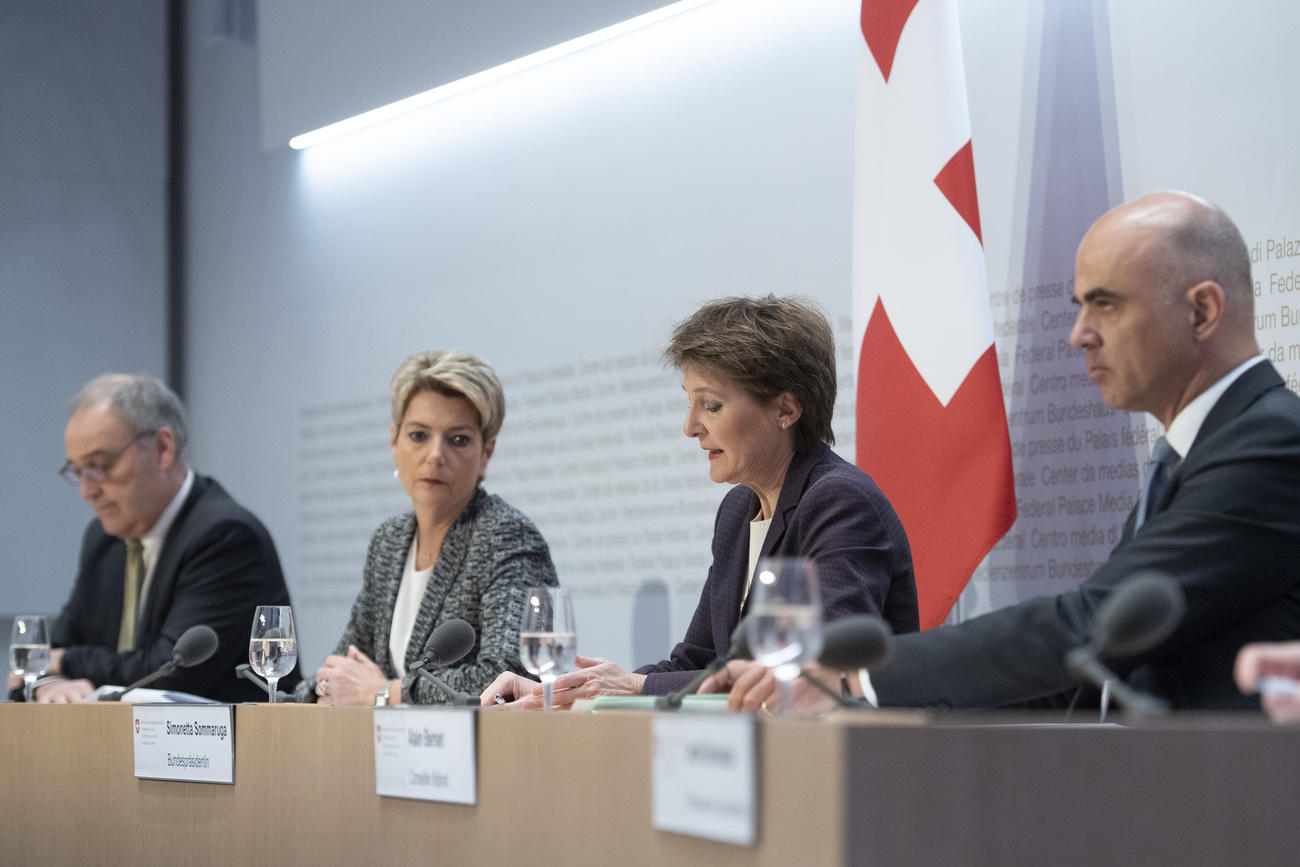
Switzerland imposes sweeping measures to contain coronavirus

Switzerland has closed schools throughout the country and imposed a ban on public gatherings of more than 100 people. The government pledged CHF10 billion ($10.6 billion) in emergency aid to support the economy and re-introduced in principle border checks with neighbouring countries.
The package of measures External linkwas announced at a news conference attended by four of the seven government ministers on Friday.
The ban on gatherings will last until at least the end of April while schools will be closed until April 4 (some cantons have bans until April 30). The border with Italy will remain open but further restrictions will be applied.
Furthermore, border controls with other European countries have been tightened with a suspension of the single border agreement. Switzerland is not a member state of the European Union but is included in the Schengen zone.
The CHF10 billion ($10.6 billion) aid package is aimed at helping companies survive the economic downturn caused by coronavirus.
Economics Minister Guy Parmelin said most of the money (CHF8 billion) was earmarked to fund the imposition of short-time work at firms while other tranches have been set aside for hardship loans and to support specific sectors such as event management.
In comparison, Switzerland’s overall budget for 2020 approved by parliament in December amounts to CHF75 billion.
Serious situation
“The situation is serious but there is no reason to panic,” said President Simonetta Sommaruga at the news conference.
“We have the medical and financial means to cope with the difficult situation,” she said.
Sommaruga said the new action plan was aimed at protecting the population and helping the business community hit hard by the Covid-19 pandemic.
“The new measures are far-reaching but we need them and we need the solidarity of the population,” she added.
Social distancing
Interior Minister Alain Berset, whose portfolio includes health matters, said social distancing is the most efficient way of stemming the spread of the virus.
He said it was key to protect the vulnerable groups of society, notably the elderly and the infirm and to avoid a collapse of the healthcare system.
Berset said the national government is working with the 26 cantons – which have a large degree of autonomy – to ensure that the health infrastructure can cope with the increased demand from coronavirus.
The government has also asked citizens to avoiding public transport during rush hours and ordered a ban on regular school lessons – in an apparent policy change.
Berset explained a new report by the European Centre for Disease Prevention and ControlExternal link (ECDC) had prompted the government to reconsider its position.
Restaurants, bars
However, the government stopped short of closing down restaurants, bars and discos, but it limited access to a maximum of 50 people at any one time.
“It’s not the moment for big parties,” said Berset, appealing notably to the younger generation to contribute to the efforts of society.
He said the government is aware the measures will slow down daily life in Switzerland considerably over the next few weeks.
“The health of the population is a priority,” he said.
The nationwide measures, which the government can impose under the terms of the Epidemics Act, have been mirrored in part already in some cantons. Ticino, which borders Italy, has already banned events and restricted restaurants, nightclubs and bars. By Friday, several cantons had already decided to shut down schools.
Limiting access from Italy
Justice Minister Karin Keller-Sutter said the travel restrictions from Italy were aimed at preventing Italian patients from seeking access to Swiss hospitals.
However, Swiss citizens, holders of a resident permit as well as cross-border workers and people transiting through Switzerland are still allowed to enter the country.
However, asylum seekers are also subject to the restrictions.
Keller-Sutter said she had notified the EU of the Swiss action plan earlier on Friday.
It’s the second package of measures by the Swiss government, following a first action plan announced last month. It included a ban on events with more than 1,000 people.

More
Coronavirus: the situation in Switzerland

In compliance with the JTI standards
More: SWI swissinfo.ch certified by the Journalism Trust Initiative






























You can find an overview of ongoing debates with our journalists here . Please join us!
If you want to start a conversation about a topic raised in this article or want to report factual errors, email us at english@swissinfo.ch.